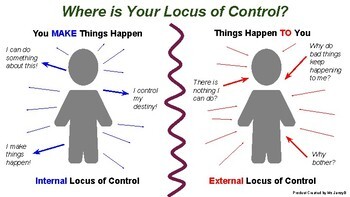
In Rotter's social learning theory, LOC is a personal characteristic that defines the person's position on a continuum between the belief that life outcomes are exclusively controlled by his own actions and the opposite belief that life outcomes are exclusively controlled by external forces. LOC was introduced by Rotter (1966) and refers to a generalised belief regarding the extent to which life outcomes are controlled by an individual's actions (internal control) or by external forces such as luck, fate or other individuals (external control). This difference has been approached through one of the most studied psychological concept: the locus of control (LOC). In psychology and other social sciences, it has been demonstrated for many years that individuals could greatly differ on the personal control that they perceive on their outcome expectancies. For those authors, only health professionals who have enough positive outcome expectancies about the consequences of those skills would have the willingness to use them and would consequently give more appropriate information and support to patients. In their theoretical model, Parle et al (1997) underlined the role that outcome expectancy beliefs could play among the determinants of assessment skills promoting the expression of cancer patients' concerns. Unfortunately, using effective skills is particularly difficult when the task is breaking news, the emotional level high and the information complex, as it is the case in oncological interviews.Īlthough it is widely recognised that physicians' characteristics could influence their communication skills in this context and lead to different communication styles, no empirical evidence is currently available. Information and support giving are effective only if given after exploring patients' feelings and if the information and the support given are realistic and take into account the interview coherence. Effective assessment skills promote the expression of cancer patients' concerns ( Maguire et al, 1996). They are the necessary tools required to assess ( Maguire, 1990), to inform ( Fallowfield and Jenkins, 1999) and to support ( Novack, 1987) patients adequately. Effective communication skills are, indeed, the key to achieve the three main purposes of physician–patient relationship.
#LOCUS OF CONTROL PROFESSIONAL#
Researches on physicians' professional competence should also imply the study of those determinants. Researches on physicians' professional quality of life should thus imply the study of determinants of communication skills. For example, in a sample of 393 consultant nonsurgical oncologists in the UK, Ramirez et al (1995) found that physicians who felt insufficiently trained in communication and management skills had significantly higher levels of burnout than those who felt sufficiently trained. In oncology, the influence of those skills on professional quality of life has been frequently emphasised. Most physicians are aware that communication skills are of great importance and would like to be trained ( Calman and Donaldson, 1991). This result provides evidence that physicians' LOC can influence their communication styles in oncological interviews and in particular the way they provide information to the patient.

Results show that physicians with external LOC give more appropriate information than physicians with internal LOC in simulated interviews ( P=0.011) and less premature information than physicians with internal LOC in clinical interviews ( P=0.015). Communication skills of the upper and lower quartiles of physicians in respect of their scores on this scale were compared using Student's t-test. LOC was assessed using the Rotter I-E scale. Communication skills were rated according to the Cancer Research Campaign Workshop Evaluation Manual. A total of 81 medical specialists were assessed in a simulated interview and a clinical interview.

It was hypothesised that physicians with external LOC would take more into account others' concerns than physicians with internal LOC and would consequently use more appropriate assessment, informative and supportive functions. LOC is a generalised belief regarding the extent to which life outcomes are controlled by an individual's actions (internal LOC) or by external forces such as luck, fate or other individuals (external LOC).

No studies are available on the impact of physicians' locus of control (LOC) on their communication skills.

Although is it widely recognised that physicians' characteristics could influence their communication styles, no empirical evidence is currently available.


 0 kommentar(er)
0 kommentar(er)
